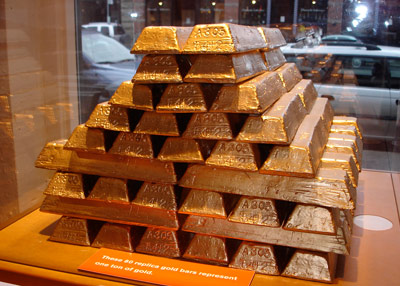Gold's Value? It's What We Give it.

Eli Lehrer misrepresents my intentions in his most recent piece. To be clear, my article was not making a case for buying gold going forward per se. Trading in commodities is a volatile and highly leveraged activity, and I would not presume to advise the general public on it. As I said in my previous article, I disapprove of celebrities offering investment advice for a fee.
However, the fact remains that Glenn Beck and other conservative commentators' past recommendations of gold as an investment were the correct call at the time they were made. That is just an empirical fact. The charts don't lie.
Mr. Lehrer may be right that gold has no intrinsic practical use, but does this mean it is only a worthless shiny rock? Mr. Lehrer seems to think so. But if Gold is worthless, then why has it never been treated as such in the history of modern civilization? Moreover, why have entire societies built their economies around this seemingly worthless shiny rock, and why has it been accepted as a unit of exchange for well over two thousand years?
I won’t rehearse the myriad examples of how gold has been an integral part of human history – that topic could fill libraries. The point is that practical use is not the same thing as value where human society is concerned. Of what practical use is silver, upon which the Spanish built an empire? What can you do with a diamond, or any precious stone for that matter? What is the practical use for a bouquet of roses? Value is not often a function of utility.
Gold’s value, however irrational its basis, is that which human beings have ascribed to it since the dawn of history. There’s no special reason why gold, rather than asphalt, shouldn’t be used to pave driveways, or why blood diamonds shouldn’t be used as paperweights. But, however irrationally, humans don’t use them for these purposes. We consider them too valuable – so much so that entire governments are willing to pay $1,650 per ounce of gold.
And because investment decisions are inherently based on what is, rather than what investors should be, that makes gold a valuable investment. And that is what matters in the here and now. The simple irrefutable fact is that gold has been a very good investment for over ten years.
Mr. Lehrer observes:
In times of economic uncertainty and malaise (whether it is now or the 1970s) Gold prices have indeed gone up rapidly…But these prices came crashing down in the 1970s and will again.
This in’t as useful a comparison as he thinks. How much like the 1970s is today's worldwide recession? Do we think the global contagion or easy money will abate any time soon? Is a serious debt reduction plan in the offing in the halls of Congress yet to be revealed? Is there less uncertainty and chaos awaiting us down the road? These are hard questions to answer if you believe what Mr. Lehrer does.
Even so, let’s assume gold does come crashing down at some point. When, and from what price? $1700 per ounce? $2500 per ounce? And where will it fall to? $800? $500? I don’t know the answers to these questions. What I do know is that as an investor, I’m inclined to ride the trend until the market starts to look like it might go sour on gold.
And that, at the end of the day, is what my article was about. It can be distilled thusly: Rightly or wrongly, Glenn Beck went on the air and told people to buy gold. Those who listened would have seen their stock rise from between $700 and $900 to $1850. In other words, at the very least, the value of their stock would have doubled. Compared to that, the most recent 200 point drop is a blip, not a massive refutation of Beck’s proposed investment strategy. If having the value of your stock double is being hoodwinked, then we should pray the entire economy is so deceived.
Now, am I saying that gold will return to its bullish ways? I have no clue, but I don’t see any reason for it not to in the short term. It may be true that gold will fall as it did after the 1970’s, but it is, in any case, a good investment now. It may be true that gold cannot be eaten or used to fuel our cars, but I’m not going to base my investment decision on the hope that, after thousands of years of fighting wars over the stuff and indeed basing entire economies around it, the human race will finally wake up to its intrinsic uselessness.

